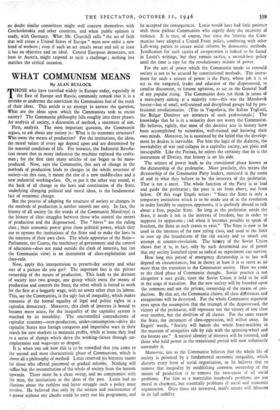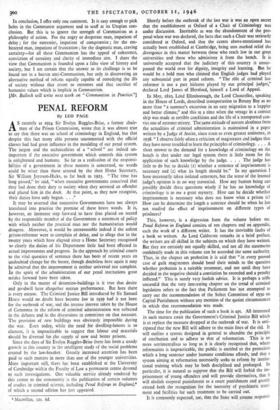WHAT COMMUNISM MEANS
By ALAN BULLOCK
THOSE who have travelled widely in Europe today, especially in the East of Europe and Russia, commonly remark that it is a mistake to underrate the conviction the Communists feel of the truth of their ideas. This article is an attempt to answer the question, What are the ideas upon which the Communists seek to recast society? The Communist philosophy falls roughly into three phases. An analysis of society, a discussion of method, a statement of aim.
First, analysis. The most important question, the Communist argues, to ask about any society is : What is its economic structure? Who owns the means of production? For the institutions, the ideas, the moral values of every age depend upon and are determined by the material conditions of life. For instance, the Industrial Revolu- tion meant that in many industries the machine replaced the crafts- man ; for the first time many articles of use began to be mass- produced. Now, says the Communist, this sort of change in the methods of production leads to changes in the whole structure of society—in this case, it meant the rise of a new middle-class and a new industrial working-class. Or, to put it the other way round, at the back of all change in the laws and constitution of the State, underlying changing political and moral ideas, is the fundamental fact of economic change.
But the process of adapting the structure of society to changes in the methods of production is neither smooth nor easy. In fact, the history of all society (in the words of the Communist Manifesto) is the history of class struggles between those who control the means of production and the dispossessed. The " haves " are the ruling class ; their economic power gives them political power, which they use to operate the institutions of the State and to make the laws in the interests of their own class. The whole apparatus of the State— Parliament, the Courts, the machinery of government and the control of education—does not stand outside the clash of interests, but (on the Communist view) is an instrument of class-exploitation and class-rule.
Now, apply this interpretation to present-day society and what
sort of a picture do you get? The important fact is the private ownership of the means of production. This leads to the division of society into two groups, one group which owns the means of production and controls the State, the other which is forced to work for the first at a beggarly wage, with no assets other than its. labour. This, say the Communists, is the ugly fact of inequality, which makes nonsense of the formal equality of legal and politic rights in a capitalist democracy. Moreover, this clash of interests is bound to become more acute, for the inequality of the capitalist system is matched by its instability. The uncontrolled contradictions of capitalist economy—over-production, under-consumption—drive the capitalist States into foreign conquests and imperialist wars in their search for new markets to maintain profits, while at home they lead to a series of slumps which drive the working-classes through un- employment and wage-cuts to despair.
It is when you ask how this is to be remedied that you come to the second and most characteristic phase of Communism, which is above all a philosophy of method. Lenin reserved his bitterest taunts for those who offered piecemeal or gradual reforms. Nothing will suffice but the reconstitution of the whole of society from the bottom upwards. There must be a clean sweep, and no compromise with the men, the institutions or the ideas of the past. Lenin had no illusions about the ,ruthless and bitter struggle such a policy must involve. He believed that only by the seizure and maintenance of a power without any cheeks could he carry out his programme, and he accepted the consequences. Lenin would have had little patience with those parlour Communists who eagerly deny the necessity of violence. It is true, of course, that since the 'thirties the Com- munists have adopted a United Front policy, combining with other Left-wing parties to secure social reforms by democratic methods. Justification for such tactics of co-operation is indeed to be found in Lenin's writings; but they remain tactics, a second-best policy until the time is ripe for the revolutionary seizure of power.
For the sort of power which the Communist needs to remould society is not to be secured by constitutional methods. The instru- ment for such a seizure of power is the Party, whose job it is to act as the vanguard, leader and educator of the dispossessed, to canalise discontent, to foment agitation, to act as the General Staff of any popular rising. The Communist does not think in terms of
a mass-party aiming at a majority vote—this was the Menshevik heresy—but of small, well-trained and disciplined groups led by pro- fessional revolutionaries. (Tito in Yugoslavia, the Italian Togliatti, the Bulgar Dimitrov are instances of such professionals.) The knowledge that he is in a minority does not worry the Communist.
He believes, rightly, that most of the decisive acts in history have been accomplished by minorities, well-trained and knowing their own minds. Moreover, he is sustained by the belief that the develop- ment he desires is inevitable. For him the logic of the dialectic, the inevitability of war and collapse in a capitalist society, are plain and inescapable. Like the Puritan, he enjoys the certainty that he is the instrument of Destiny, that history is on his side.
The seizure of Power leads to the transitional phase known _as the dictatorship of the proletariat. More precisely, this means the dictatorship of the Communist Party leaders, exercised in the name of and in what they believe to be the interests of the proletariat. That is not a sneer. The whole function of the Party is to lead and guide the proletariat ; the pace is set from above, not from below. Of this stage Engels writes: "Since the State is only a temporary institution which is to be made use of in the revolution in order forcibly to suppress opponents, it is perfectly absurd to talk about a free, popular State. So long as the proletariat needs the State, it needs it not in the interests of freedom, but in order to suppress its opponents ; End when it becomes possible to speak of freedom, the State as such ceases to exist." The State is now to be used in the interests of the new ruling class, and used to the limit to root up the foundations of the old society and to smash any attempt at counter-revolution. The history of the Soviet Union shows that it is, in fact, only by such determined use of power that any society launched upon so radical an experiment can survive.
How long this period of emergency dictatorship is to last will depend on circumstances, but in theory at least it is to serve as no more than the transition to the Communist society. Here we come to the third phase of Communist thought. Soviet practice is not altogether a sure guide, since the Soviet Union is held to be still in the stage of transition. But the new society will be founded upon the common, and not the private, ownership of the means of pro- duction. By that act, the Communist claims, all class differences and antagonisms will be destroyed. For the whole Communist argument rests upon the assumption that the triumph of the dispossessed, the victory of the proletariat, will represent not the victory of one class over another, but the abolition of all classes. For the same reason the State, the intniment of class-oppression, will wither away. In Engels' words, "Society will banish the whole State-machine to the museum of antiquities side by side with the spinning-wheel and the bronze axe." A natural identity of interests will be restored, and those who held power in the transitional period will now voluntarily surrender it.
Moreover, just as the Communist believes that the whole life of society is poisoned by a fundamental economic inequality, which distorts every form of social organisation, so he believes that to remove that inequality by establishing common ownership of the means of production is to remove the root-cause of all social problems. For him as a materialist mankind's problems are not moral in character, but essentially problems of social and economic organisation. Once these are answered, man's nature will blossom in its full nobility. In conclusion, I offer only one comment. It is easy enough to pick boles in the Communist argument and to scoff at its Utopian con- elusion. But this is to ignore the strength of Communism as a philosophy of action. For the angry or desperate man, impatient of delay ; for the extremist, impatient of compromise ; for the em- bittered man, impatient of frustration ; for the dogmatic man, craving certainty—for all these Communism has the appeal of coherence, conviction of certainty and clarity of immediate aim. I share the view that Communism is founded upon a false view of history and society, but I am certain that the answer to its challenge is to be found not in a barren anti-Communism, but only in discovering an alternative method of refcrm equally capable of remedying the ills of society without that resort to extremes and that sacrifice of humanist values which is implicit in Communism.
[Mr. Bullock will write next week on "Communism in Practice."]































 Previous page
Previous page